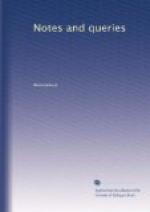“The year before his death, (he) being at his country house in Reading, my friend and I travelled that way.... One day, after dinner, we retired to his garden, and fell into the discourse of acting.” Thus is introduced his Essay, &c., continuing to p. 174, where it abruptly ends thus:—“After this discourse, we took our leaves of Mr. Betterton, and returned to London. I was pleased with his story,” &c.
My copy is dedicated to Richard Steele, Esq., by Charles Gildon, and has prefixed to it the beautiful portrait of Betterton, engraved by Vander Gucht, from Kneller’s picture, and, at its close (but separately paged), “The Amorous Widow or the Wanton Wife, now first printed from the original copy,” 1710. E.
Incumbents of Church Livings.
A correspondent in Number 4, writes to inquire for information relative to the “names and birthplaces of incumbents of church livings prior to 1680, and the patrons of them.”
It may slightly help his investigations to know that there is a Latin MS. in the British Museum, numbered Additional MSS. 12,483, with the title “Ecclesiastical Visitation of Hampshire and the Isle of Wight, held in March and April 1543, by Nicholas Harpisfelde, Official of the Archdeacon of Winchester,” folio, containing the names of the incumbents and churchwardens of the livings in those counties.
W.M. KINGSMILL.
Westminster, December 1849.
Mars de Saham—Portum Pusillum.
The first appears to be Soham, in Cambridgeshire; described in Liber Eliensis as “terra de Saham, quae est ad stagnum juxta Ely.” Does “mare” stand for “stagnum,” “palus,” “mariscus,” or our English “mere?” Can Portum Pusillum be Littleport, in the same country?
J.F.M.
Reinerius—Inquisition in France.
Sir,—Faber, in his work on the Waldenses, quotes Reinerius, in Biblio. Patrum. I have in vain looked in modern biographical dictionaries for any account of Reinerius, so am constrained to inquire of some of your readers, who and what he was, or to beg the favour of a reference to some accessible account of him. I think Faber says he was an inquisitor; and this is the extent of the information which I have been able to collect respecting him.
I wish also to inquire whether his work on Heretics (his only work, I presume) has been published in any other and more accessible form than that in which it was referred to by Faber; and, particularly, whether it has ever been translated into English.
I have often wished to know whether the tribunal of the Inquisition was ever established elsewhere in France than at Toulouse. Can any of your correspondents enlighten me on the point, and give me references in proof?
D.
[The work of Reinerius Saccho was first published by the Jesuit Gretser in 1613, and has since been reprinted in the different editions of the Bibliotheca Patrum. It has never been translated into English.]
Whelps.




